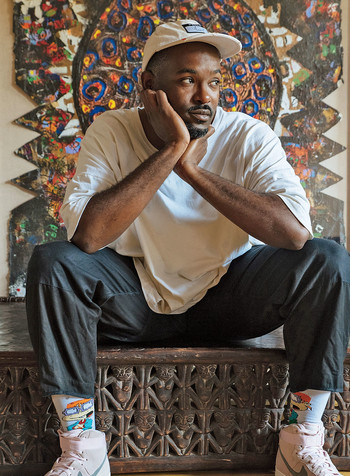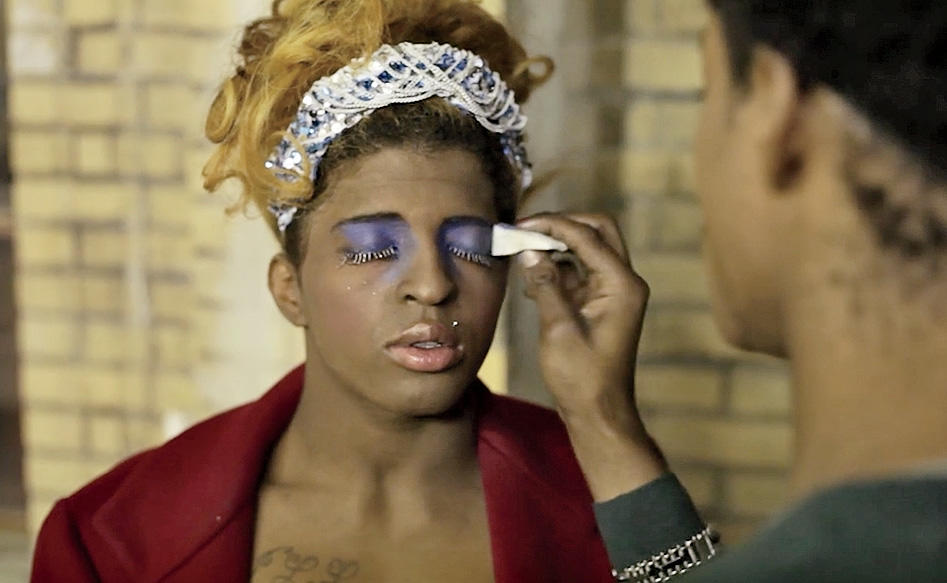Filmmaker Elegance Bratton ’14GS loves to tell stories about families — notably, the alternative families that support and nurture homeless LGBTQ youth. His work, including the documentary Pier Kids, which hits film festivals this year, has predominantly looked at New York City’s ballroom scene, a subculture of queer people who band together in “houses” and organize drag-centric dance and catwalk competitions.
“Ballroom is a community built around the notion of family,” says Bratton. “You’ve got house mothers and fathers, brothers, sisters, cousins, aunties — pretty much everyone that gay kids lose when they’re kicked out of their homes.”
Bratton, who is gay, says his own mother forced him out of their New Jersey home back in 1996. He was just sixteen. He drifted between friends’ couches and the streets and spent a lot of time hanging out on the Christopher Street Pier, by Greenwich Village, a known haven for castoff gay and transgender kids.
Bratton’s life changed in 2005. He asked his mother if he could move back home, and she suggested that he join the military instead. Naturally, he was hesitant: “This was the time of the Iraq War, but I looked around and thought, ‘Do I really want to keep living in a shelter?’” So he enlisted in the Marines. Bratton scored high on the placement exam and had his choice of jobs. Though he could have become an intelligence officer, he didn’t like the idea of being a spy — “As a closeted gay kid, I had had enough of living in disguise.” He opted for the combat photography and film division, where he learned how to tell stories with a camera.
After leaving the military in 2010, Bratton entered Columbia’s School of General Studies and rented his first apartment. “But I realized that I still didn’t know what ‘home’ was for me,” he says. That loss became more glaring at the end of freshman year. “Kids going home is a big deal as an undergrad. Families show up, there’s banners and pets and stuffed animals, parents, brothers, sisters … And I kept asking myself, ‘What is home? Where is home? Why is home?’” With no family to return to for the summer, Bratton found himself back on the pier — this time with a camera.
Pier Kids follows a group of queer, Black youths who are also estranged from their families. During production Bratton split his time between campus and shooting locations. “Half the week I’d be in class, focused on the transformation of my life, and the other half I’d be re-experiencing homelessness through filming,” he says, adding that the emotional toll of capturing the documentary’s four hundred hours of raw footage, paired with funding setbacks, delayed the film’s completion until this year.
In the meantime, Bratton has been busy with other projects. He graduated from NYU’s Tisch School of the Arts with an MFA in film in May. He’s directed and produced several short films, published a photo book on ballroom called Bound by Night, and executive-produced the documentary series My House, which aired to critical acclaim on the Viceland TV network last year. Now Bratton is working on The Inspection, a semi-autobiographical feature film about a gay teen who joins the Marines during the Don’t Ask, Don’t Tell years. “It’s kind of like Moonlight meets Full Metal Jacket,” he says.
Whatever the artistic endeavor, Bratton is passionate about introducing the public to new faces and perspectives. “I’m still in the process of learning how to make work that features queer people of color and gives those identities their full value in the industry,” he says, adding that film backers often resist taking on scripts that deal with atypical subject matter. “It comes down to relatability. And whiteness is kind of a baseline.”
Bratton says that he considers himself part of a long line of queer historians, activists, and artists who have made it their life’s mission to introduce the LGBTQ community to a mass audience. He praises TV impresarios like RuPaul of RuPaul’s Drag Race and Ryan Murphy of Pose for helping to bring content about drag and ballroom culture — and queer people of color — into America’s living rooms.
Though Bratton’s career is just getting started, he’s candid about what he’s seeking in the long run. Simply put, he wants fame, less for himself than for the actors and artists he casts in his work. “I feel like directors are only as good as the people they make famous, so I want to make lots of really great people famous.”
This article appears in the Summer 2019 print edition of Columbia Magazine with the title "Home Movies."




